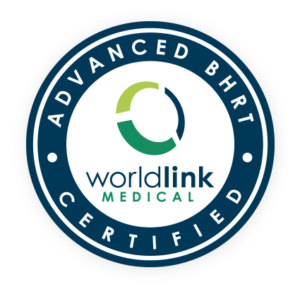Polycystic ovary syndrome (PCOS) is a problem with hormones that happens during the reproductive years. If you have PCOS, you may not have periods very often (irregular menses). Or you may have periods that last many days, which can vary from being very heavy to very light. This is from a hormonal imbalance, typically from low progesterone and possibly too much testosterone. It is the leading cause of infertility (or difficulty getting or maintaining pregnant) in women.
• Irregular menses (or no menses)
• Ovarian cysts
• Hirsutism (excess facial or body hair)
• Periods that are heavier or lighter than usual
PCOS can increase the risk of other chronic health concerns, including Type 2 Diabetes, obesity, heart disease, high blood pressure, and stroke.
While there’s no cure for PCOS, symptoms can be improved through lifestyle changes, BHRT, medications, and fertility treatments. Lifestyle changes, such as diet and aerobic exercise, can help maintain or lose weight.

